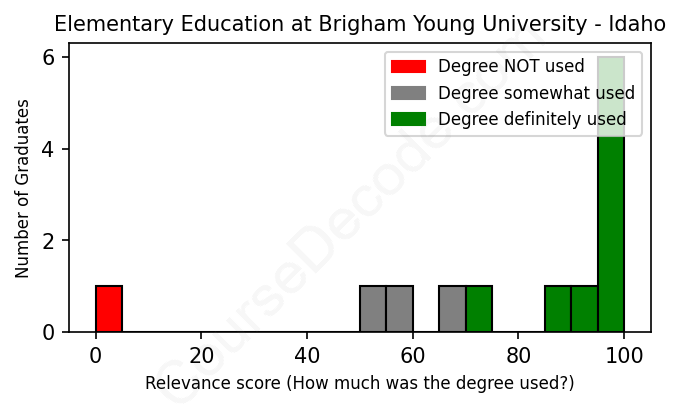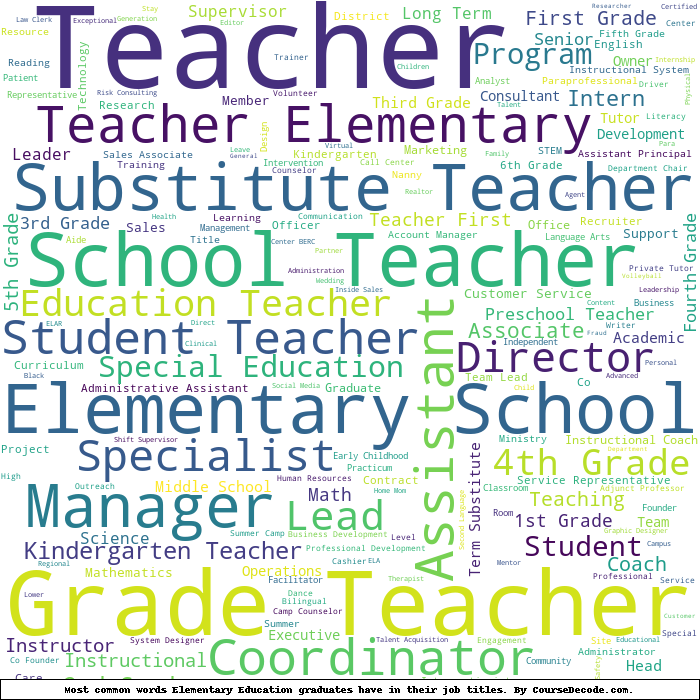
First, some facts. Of the Elementary Education graduates from Brigham Young University - Idaho we've analyzed , here's how many have used (or NOT used) their degree in their career:

These are estimates based on AI analysis of 13 LinkedIn profiles (see below).
The verdict? Significantly above average. Overall, with an average relevance score of 78%, Elementary Education graduates from Brigham Young University - Idaho have a much higher likelihood (+11%) of finding work in this field compared to the average graduate across all fields:
And for comparison, here's the chart for all profiles we've looked at across all degrees.
Also, after graduating, only 15% of these graduates have pursued further education other than another Bachelor's degree (such as a Masters degree or other), compared to the average across all profiles of 35%. This suggests a Bachelors degree is enough for most Elementary Education graduates, and it's normal to look for work straight after graduation.
See the details:
|
Relevance score: 100% We think this person has gone into a career highly relevant to their degree. We think this person has gone into a career highly relevant to their degree.
DEGREE INFOGraduated in 2017 from Brigham Young University - Idaho with a Bachelor's degree in Elementary Education. No other secondary education since. JOB HISTORY SINCE GRADUATIONLong Term Substitute Teacher West Ada School District Oct 2019 - Present ABOUTI have always strived to create a positive and productive learning environment in the classrooms which I have worked in. I have done this with my enthusiasm to build relationships with the students along with my dedication to their individual successes. I believe in utilizing collaboration to work toward common goals as well as building relationships to establish a culture of respectful learning. From earning my degree at BYU-Idaho to teaching in the classrooms, I have always loved phonetics as well as teaching science. My qualifications include three semesters of practicum teaching, one semester of student teaching, five months as a long-term substitute, and one year of substitute teaching. I especially have found being a substitute beneficial to my career. There is a plethora to learn from how other teachers manage their classrooms. In this line of work, I have discovered many methods which I will adopt into my own classroom. |
The top 10 most common jobs done by the graduates we've analyzed (ranked most common to least) are:
When looking at the job history of graduates with a degree in Elementary Education from Brigham Young University - Idaho, it’s pretty clear that a lot of them end up in teaching roles. Many individuals worked as Student Teachers or Substitute Teachers right after graduation, which makes sense since those positions allow new teachers to gain practical experience in a classroom setting. As they progress in their careers, several continue teaching in elementary schools, with some taking on specialized roles like Special Education Paraprofessionals or even transitioning into positions like Tutors or ESL Teachers. Pretty much all of these teaching-related jobs directly relate to what they studied and help apply all that theory they learned during their degree.
However, there are a fair number of graduates who wander off the beaten path. Some end up in roles like Administrative Coordinators, Project Assistants, or Research positions that don’t really align with being in a classroom. While they may use some skills like organization or communication, their day-to-day tasks often stray far from the core principles of elementary education. So, while the job market certainly has multiple avenues, a significant chunk of these grads seems to stay true to their roots in teaching and education-related functions, ensuring that their degrees are put to good use. All in all, it looks like the degree pays off if you’re aiming to be in a classroom, but not all graduates stick with that path.
Here is a visual representation of the most common words in job titles for Elementary Education graduates (this is across all Elementary Education graduates we've analyzed, not just those who went to Brigham Young University - Idaho):

It looks like graduates from BYU-Idaho with a degree in Elementary Education often start their careers on a pretty solid educational footing. Many of them secure roles as student teachers or substitute teachers right after graduation, which is a great way to get hands-on experience. For instance, the 2010 grad spent time as a student teacher before landing a full-time first-grade position, and several other graduates followed a similar path, jumping into teaching roles soon after completing their degrees. This pattern indicates that a good number of alums are sticking closely to their education roots and finding work in schools, which is definitely a positive sign for those looking to pursue a fulfilling career in teaching.
Fast forward a few years, and we see a mix of trajectories. Some folks have stayed in the teaching field, while others have ventured into related areas like educational administration, tutoring, and even some non-teaching roles. There are graduates who have chosen to take breaks from teaching, like one grad who is now a stay-at-home mom, showing that some people may prioritize family or other interests down the line. Nevertheless, most still appear to be involved in roles that align with education, whether that’s teaching directly or working in supportive educational environments. While a few have drifted off into unrelated careers, it seems like a significant portion of these BYU-Idaho graduates are doing well in their field, which is encouraging for current students considering this path.
Getting a Bachelor’s degree in Elementary Education at BYU-Idaho is generally considered to be on the easier side compared to some other majors, but that doesn’t mean it's a walk in the park! There’s definitely a lot of hands-on work, like lesson planning and classroom management, which can be pretty challenging. Plus, you’ll have to complete a student teaching requirement, and that part can be both exciting and nerve-wracking. Overall, if you’re passionate about working with kids and willing to put in the effort, you’ll probably find it manageable, especially with the supportive environment at BYU-Idaho. Just be ready to juggle your classes, projects, and field experiences!
Most commonly, in the LinkedIn profiles we've looked at, it takes people 4 years to finish a Bachelor degree in Elementary Education.
Looking at the job histories of these BYU-Idaho Elementary Education grads, it seems like their paychecks might not be soaring too high. Most of them started off with student teaching or substitute teaching gigs, which are typically low-paying, and even when they landed full-time teaching jobs, salaries for elementary teachers generally don’t break the bank, especially in certain areas. Some have taken on various roles or shifted careers a bit, which could mean they’re scrambling to find higher-paying opportunities. Overall, while they’re all contributing to education (which is super important), it doesn't look like they’re raking in the big bucks just yet.
Here is a visual representation of the most common words seen in the "about" section of LinkedIn profiles who have a Bachelor degree in Elementary Education (this is across all Elementary Education graduates we've analyzed, not just those who went to Brigham Young University - Idaho). This may or may not be useful:

Here are all colleges offering a Bachelor degree in Elementary Education (ordered by the average relevance score of their Elementary Education graduates, best to worst) where we have analyzed at least 10 of their graduates: